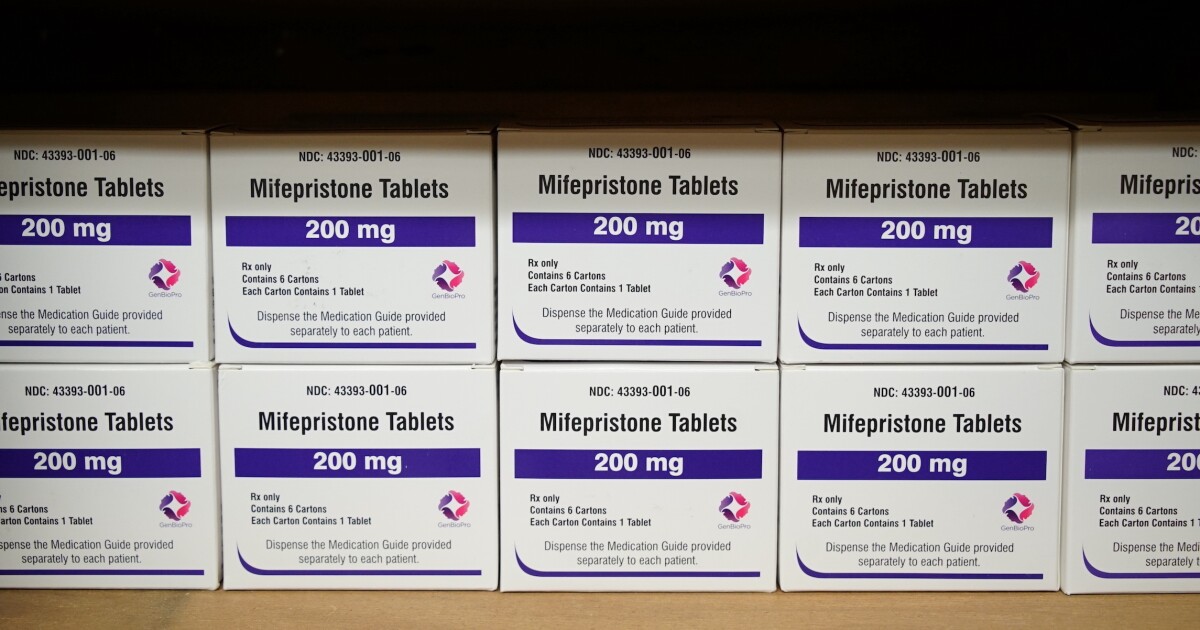

An anti-abortion student organization is petitioning the Food and Drug Administration to rescind its approval of the abortion pill mifepristone, calling for an assessment of water contamination.
Students for Life of America started circulating its petition, which calls for an assessment of the country’s recreational lakes and rivers for water contamination, on July 31 as the fourth installment pressuring the FDA to halt its approval of the drug.
BIDEN AND REPUBLICANS DUKE IT OUT TO DEFINE THE ECONOMY
Other petitions have called to focus potential pollution in drinking water as well.
SFLA President Kristan Hawkins and Chief Media and Policy Strategist Kristi Hamrick wrote the 25-page document laying out the cause for concern, saying that a large portion of abortions in America are done chemically, resulting in chemicals, “human remains and tissue in the water systems of the country.”
“Today, more than half of all abortions — says the abortion industry — are committed with pills, meaning that all of that tissue and human remains goes into our water supply,” Hamrick told the Washington Examiner. “Some ingredients of the first pill in the Chemical Abortion Pill protocol continue to be active after leaving a woman’s body. What is that doing to fish, animals, endangered species, plants, and even human beings?”
“Biden’s FDA never checked,” she said.
All federal agencies are required to assess their actions under the National Environmental Policy Act, which SFLA is demanding the FDA do regarding their 2000 approval of mifepristone. Furthermore, the petition invoked the Clean Water Act and the U.S. Environmental Protection Agency’s responsibility to ensure clean water, calling mifepristone an example of “nonpoint source pollution” which is state-regulated but subject to EPA review.
SFLA’s petition also says the FDA claims to have done a review about the effects, but that they simply accepted the findings of a study done by the Population Council, a leading advocate and researcher into contraception and the abortion pill.
“No tests were done. No precautions, like Red Bag Medical Waste Disposal, were required,” Hamrick said. “The Biden Administration gave Big Abortion Pharma a gift in outsourcing disposal — something brick-and-mortar abortion vendors don’t even get.”
“When the Biden Administration set up No Test, Online Distribution of Chemical Abortion Pills — in the name of COVID response — they set up government-sanctioned, corporate dumping of tainted blood, placenta tissue, and human remains into our water supply,” she continued.
Hamrick confirmed to the Washington Examiner that SFLA plans to bring legal action against FDA.
Among several sources, SFLA cites EPA guidance not to flush any pharmaceuticals down the toilet, because “drugs flushed down the toilet can leach into the ground and seep into ground water,” according to the agency.
In addition, the group points to the American Academy of Family Physicians in guidance on improper medical waste disposal, stating, “Home based health care can create medical waste which can be hazardous if not disposed properly. Inappropriate medical waste disposal can pose harmful environmental concerns and significant health risks to the public, which include but are not limited to, potential water contamination, inadvertent sharp-stick injuries, and toxic exposure to pharmaceutical products.”
Studies have shown pharmaceuticals can enter the water stream and have an effect on species.
A 2020 National Institutes of Health study shows that estrogen can enter the water supply in various ways, including through urine from women who take birth control pills.
“Although ethinylestradiol from birth control pills is an additional endocrine disrupting chemical that contributes to the feminization of aquatic species, the contribution of this compound to drinking water estrogenicity has been shown to be less than that from other sources,” the study states.
CLICK HERE TO READ MORE FROM THE WASHINGTON EXAMINER
“Exposure to estrogens present in the environment is known to impair development and reproductive function” in “non-human animals,” and has been linked to increased breast cancer in women and infertility in men. “Studies show that estrogens that contaminate surface waters worldwide can negatively influence the fertility and reproductive capacity of non-human animals and humans,” the NIH study said.
Both EPA and FDA confirmed receipt of a request for comment from the Washington Examiner but did not comment.






